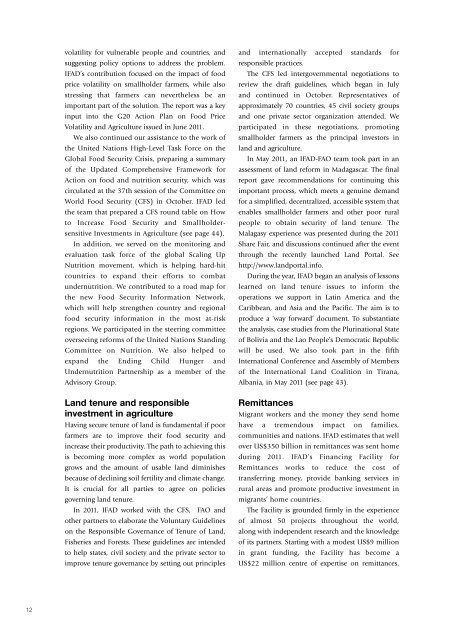ANNUAL REPORT 2011 - IFAD
ANNUAL REPORT 2011 - IFAD
ANNUAL REPORT 2011 - IFAD
Create successful ePaper yourself
Turn your PDF publications into a flip-book with our unique Google optimized e-Paper software.
12<br />
volatility for vulnerable people and countries, and<br />
suggesting policy options to address the problem.<br />
<strong>IFAD</strong>’s contribution focused on the impact of food<br />
price volatility on smallholder farmers, while also<br />
stressing that farmers can nevertheless be an<br />
important part of the solution. The report was a key<br />
input into the G20 Action Plan on Food Price<br />
Volatility and Agriculture issued in June <strong>2011</strong>.<br />
We also continued our assistance to the work of<br />
the United Nations High-Level Task Force on the<br />
Global Food Security Crisis, preparing a summary<br />
of the Updated Comprehensive Framework for<br />
Action on food and nutrition security, which was<br />
circulated at the 37th session of the Committee on<br />
World Food Security (CFS) in October. <strong>IFAD</strong> led<br />
the team that prepared a CFS round table on How<br />
to Increase Food Security and Smallholdersensitive<br />
Investments in Agriculture (see page 44).<br />
In addition, we served on the monitoring and<br />
evaluation task force of the global Scaling Up<br />
Nutrition movement, which is helping hard-hit<br />
countries to expand their efforts to combat<br />
undernutrition. We contributed to a road map for<br />
the new Food Security Information Network,<br />
which will help strengthen country and regional<br />
food security information in the most at-risk<br />
regions. We participated in the steering committee<br />
overseeing reforms of the United Nations Standing<br />
Committee on Nutrition. We also helped to<br />
expand the Ending Child Hunger and<br />
Undernutrition Partnership as a member of the<br />
Advisory Group.<br />
Land tenure and responsible<br />
investment in agriculture<br />
Having secure tenure of land is fundamental if poor<br />
farmers are to improve their food security and<br />
increase their productivity. The path to achieving this<br />
is becoming more complex as world population<br />
grows and the amount of usable land diminishes<br />
because of declining soil fertility and climate change.<br />
It is crucial for all parties to agree on policies<br />
governing land tenure.<br />
In <strong>2011</strong>, <strong>IFAD</strong> worked with the CFS, FAO and<br />
other partners to elaborate the Voluntary Guidelines<br />
on the Responsible Governance of Tenure of Land,<br />
Fisheries and Forests. These guidelines are intended<br />
to help states, civil society and the private sector to<br />
improve tenure governance by setting out principles<br />
and internationally accepted standards for<br />
responsible practices.<br />
The CFS led intergovernmental negotiations to<br />
review the draft guidelines, which began in July<br />
and continued in October. Representatives of<br />
approximately 70 countries, 45 civil society groups<br />
and one private sector organization attended. We<br />
participated in these negotiations, promoting<br />
smallholder farmers as the principal investors in<br />
land and agriculture.<br />
In May <strong>2011</strong>, an <strong>IFAD</strong>-FAO team took part in an<br />
assessment of land reform in Madagascar. The final<br />
report gave recommendations for continuing this<br />
important process, which meets a genuine demand<br />
for a simplified, decentralized, accessible system that<br />
enables smallholder farmers and other poor rural<br />
people to obtain security of land tenure. The<br />
Malagasy experience was presented during the <strong>2011</strong><br />
Share Fair, and discussions continued after the event<br />
through the recently launched Land Portal. See<br />
http://www.landportal.info.<br />
During the year, <strong>IFAD</strong> began an analysis of lessons<br />
learned on land tenure issues to inform the<br />
operations we support in Latin America and the<br />
Caribbean, and Asia and the Pacific. The aim is to<br />
produce a ‘way forward’ document. To substantiate<br />
the analysis, case studies from the Plurinational State<br />
of Bolivia and the Lao People’s Democratic Republic<br />
will be used. We also took part in the fifth<br />
International Conference and Assembly of Members<br />
of the International Land Coalition in Tirana,<br />
Albania, in May <strong>2011</strong> (see page 43).<br />
Remittances<br />
Migrant workers and the money they send home<br />
have a tremendous impact on families,<br />
communities and nations. <strong>IFAD</strong> estimates that well<br />
over US$350 billion in remittances was sent home<br />
during <strong>2011</strong>. <strong>IFAD</strong>’s Financing Facility for<br />
Remittances works to reduce the cost of<br />
transferring money, provide banking services in<br />
rural areas and promote productive investment in<br />
migrants’ home countries.<br />
The Facility is grounded firmly in the experience<br />
of almost 50 projects throughout the world,<br />
along with independent research and the knowledge<br />
of its partners. Starting with a modest US$9 million<br />
in grant funding, the Facility has become a<br />
US$22 million centre of expertise on remittances.

















